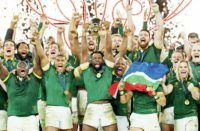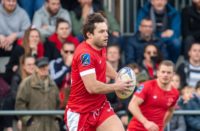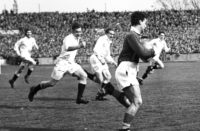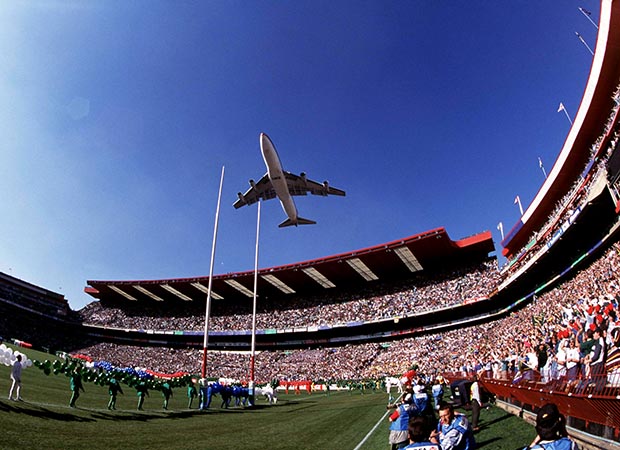 It's 20 years ago today that President Nelson Mandela presented Francois Pienaar with the World Cup at Ellis Park to bring down the curtain on what remains the best World Cup in the competition's admittedly comparatively sort history.
It's 20 years ago today that President Nelson Mandela presented Francois Pienaar with the World Cup at Ellis Park to bring down the curtain on what remains the best World Cup in the competition's admittedly comparatively sort history.
“Francois, fantastic support from 63,000 South Africans here today?” TV anchor-man David van der Sandt said straight after the Boks had beaten the All Blacks with a Joel Stransky dropped goal in extra time. Without missing a beat, Pienaar replied: “David, we didn't have the support of 63,000 South Africans today, we had the support of 42 million South Africans.”
It was an extraordinary day and it's strange which random memories that hit you 20 years later. The jumbo jet fly-past naturally tops the list that was the single most spine-tingling moment I can ever recall in a sports arena.
Unexpected but well-rehearsed – captain Laurie Kay and his crew had trained for weeks on a SA Airways simulator and undertaken a dawn dummy run a few days earlier – it was the second fly-past that had fans throwing themselves to ground and rocked Ellis Park to it foundations. Talking to Kay some years later he admitted that it was never meant to be quite that low.
There was picture in the local papers the next day of police snipers on the roof of the stadium appearing to duck – Kay also mischievously revved the engine up for maximum effect. “Go Bokke,” it read on the underbelly of the plane but the subliminal message was: “South Africa you are cleared for take-off.”
Then there was the Presidential box situated a couple of feet behind where myself, Paul Ackford and Clem Thomas were sitting in cramped Press seats. A couple of hours before kick-off the great and the good started arriving including the President, reading the match programme quietly in the corner by the box window and then wandering around the room almost innocuously in his Springbok shirt along with a handful of other VIPs similarly dressed. South Africans supporting their team.
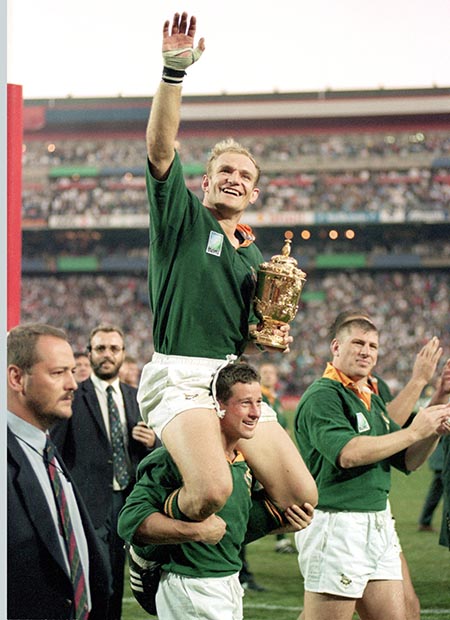 Only when he stepped onto the pitch for the pre-match presentations did the full impact of Mandela's choice of attire come home. In those more innocent days, incidentally, Mandela's security guards handed down through the open box window a handful of deliciously cold tinnies and sandwiches for the flagging British press.
Only when he stepped onto the pitch for the pre-match presentations did the full impact of Mandela's choice of attire come home. In those more innocent days, incidentally, Mandela's security guards handed down through the open box window a handful of deliciously cold tinnies and sandwiches for the flagging British press.
Perversely my one absolute cast iron memory of the post-match celebrations apart from Pienaar's oft-quoted exchange with Van der Sandt is of diminutive centre Hennie le Roux carrying his 17st-plus skipper Pienaar and the cup around Ellis Park on his shoulders. On his own. At 6,000ft-plus altitude. After 100 minutes of torrid rugby against the All Blacks. Respect.
Among many things, South Africa circa 1995 were one of the best conditioned teams ever to play World Cup rugby.
When people recall the ‘miracle' of the 1995 World Cup they are usually referring the Mandela-inspired coming together of a recently democratised nation in which the black and coloured majority supported the iconic sporting team of the recent white overlords oppressors. And, yes, all of that is gloriously true and is it any wonder Hollywood eventually got around to making an Oscar-nominated film, Invictus, in 2009. Not so well-chronicled, perhaps, is the rugby miracle that went against all the accepted norms of building a team. South Africa had only ended 12 years in the international wilderness in 1992 and were largely an ineffective mishmash trying to play catch-up until eight months out from the 1995 tournament.
That's when Transvaal coach Kitch Christie took over from the sacked Ian McIntosh after a series defeat against New Zealand. His experience is one that will surely give one or two beleaguered coaches out there right now renewed hope. To win a World Cup you only have to play well for five or six weeks. In fact, sometimes you only need to produce the goods for the fortnight which encompassed the three knock-out games.
Christie's Boks squad was, in truth, rather cobbled together against the clock and dispersed with almost indecent haste – their nation-building, World Cup-winning job done. Their place in history assured. In the front row Chris Rossouw only ever played 12 Tests and prop Gary Pagel made four of his five Test appearances at the 1995 World Cup.
Man mountain lock Kobus Wiese won just 19 caps while Ruben Kruger started to pick up injuries and then, alas, become very ill and was forced to retire. Joel Stransky hit injury problems as well. Chester Williams, the tournament's poster boy and black South Africa's representative at the party, was in and out of the team and ultimately finished with a career total of just 22 Tests.
Their young captain Francois Pienaar played just 29 Tests and was ruthlessly axed, surplus to requirements, just over a year on by which time Christie had also been forced to step down with ill health. Only three players went on to compile Test careers of 50 caps or more – Os du Randt, Mark Andrews and Joost van der Westhuizen – but in 1995 they were relatively inexperienced young tyros. Inevitably so. By way of comparison only Trevor Woodman of England's World Cup winning team eight years later finished their careers with fewer than 50 England caps, his career brought to a premature end by injury.
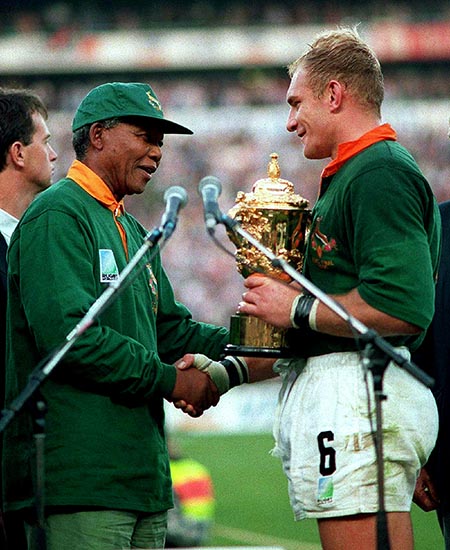 The Bok class of '95 was neither the start nor end of a great generational team for the ages, they were an incredible one-off ad hoc band of brothers gathered in extremis and tasked with the seemingly impossible. For a very brief period in history they soared. Pienaar has always tried to explain the possibly in explicable by quoting a short passage from French poet Guillaume Apollinaire – “‘Come to the edge,” he said. ‘We are afraid,' they replied. ‘Come to the edge', he said. They came, he pushed them, and they flew.”
The Bok class of '95 was neither the start nor end of a great generational team for the ages, they were an incredible one-off ad hoc band of brothers gathered in extremis and tasked with the seemingly impossible. For a very brief period in history they soared. Pienaar has always tried to explain the possibly in explicable by quoting a short passage from French poet Guillaume Apollinaire – “‘Come to the edge,” he said. ‘We are afraid,' they replied. ‘Come to the edge', he said. They came, he pushed them, and they flew.”
Another intriguing aspect of the 1995 fairytale was – is – to what extent the triumph heralded a breakthrough for the future of black and coloured South African rugby? Despite the stereotyping of football being the sport of the ethnic black and coloured communities both had always possessed a rugby culture, albeit dwarfed and discriminated against by the all-powerful white rugby community which not only spawned absolutely world-class players but, because of apartheid, totally controlled the administration of the sport.
The 1995 squad contained just one black player – Williams – and due to a hamstring injury on the eve of the tournament was only drafted back into the squad for the knock-out stages when South Africa were reduced through injury and suspensions. Earlier in the tournament, as an employee of Western Province, and with time on his hands, he actually worked as the ‘gofer' and water boy for the Australia bench in their opening game against South Africa.
Williams' Springbok experience was not entirely happy as he revealed some years later in his autobiography. Springbok mealtimes in particular were a nightmare. Williams dreaded arriving early and having to choose a table first. He would sit there humiliated on his own, waiting in vain for a white player to join him. There were notable exceptions – Gary Teichmann, Rassie Erasmus, Werner Swanepoel – but the cringing memory of those moments stayed with him.
South Africa soon starting toying with racial quotas in both their rugby and cricket teams, a well-meaning but fraught concept in sport where being the best, and being selected on merit, is ultimately sacrosanct and in the eyes of many non-negotiable.
The politicians were busy implementing positive discrimination in every other aspect of life and nobody seriously argued with that necessary development but it has never transferred easily to the sporting arena.
By the end of his playing career, Williams had grown to heartily detest the quota system that existed at the time whereby Springbok and provincial sides would be required to nominate a minimum of three players of colour in their squads of 22. On the Springbok tour of Britain and Ireland in 2000, coach Harry Viljoen bluntly told Williams he was finished as an international player after the Ireland Test, yet needed him on the bench against England. A cosmetic and cynical selection if ever there was one.
“I was definitely not a product of any enlightened developmental system put in place to help black and coloured players,” he insisted to me once, ironically in the SARU offices in Cape Town.
“No way. I did it the hard way. I fought my way up through the ‘white' system on merit. I am a rugby player, pure and simple, that is my story. I found it degrading to be put on the bench just to make up the quota, as was the case against England. I would much rather have been dropped altogether, that would be much more honest.”


